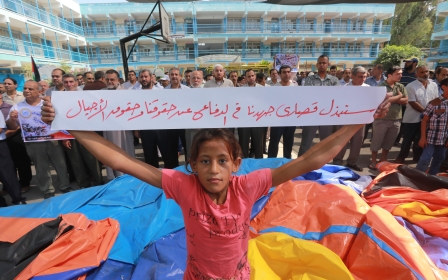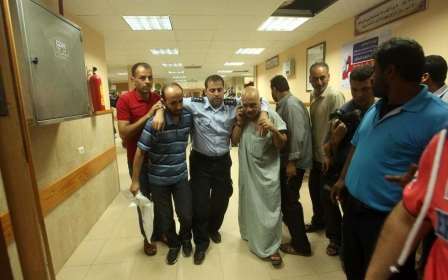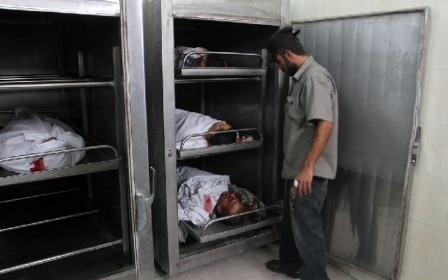Mystery in Gaza over identity of group that claimed rocket attacks

GAZA CITY - Many Gazans are puzzled and concerned about the latest rocket attacks on Israel by a hitherto unknown militant group which analysts say is using grievances about the blockade of the Palestinian enclave and Israeli settler violence to raise its own profile.
The group, which calls itself “The Grandsons of the Companions of the Prophet”, last week fired three rockets into Israel before using Twitter to announce its presence in Gaza.
It claimed it had launched the attack in response to the death of a Palestinian baby in an arson attack by Israeli settlers in the West Bank.
On Wednesday, using a Twitter account, the group claimed that it fired another two rockets over Tuesday night at the Zikin Kibbutz in southern Israel. The group also tweeted that Israel denied that their rockets fell within Israeli territory, but insisted they had hit Israeli land.
Most groups in Gaza maintaining a presence on the ground and distributing leaflets about their activities, so the announcements of this new group have aroused public confusion and suspicion.
Several analysts said they felt Gaza was being used as a convenient launch pad by some whose main motives were not the interests of Palestinians.
Ibrahim Al Madhoun, a Gaza analyst and researcher of Islamic groups, said that some new groups were inspired by the mindset of the Islamic State (IS) group.
“‘The Grandsons of the Companions of the Prophet’ is more of an unknown, than an actual group. I believe they are individuals inspired by the thinking of Islamic State, but who could not materialise as a power on the ground,” Madhoun told Middle East Eye.
Gaza’s de facto authorities have assured the public that such groups do not pose a threat on the ground, and Madhoun said they only exist on the internet.
“If they don’t come out with real, known leaders then this is merely an attempt to violate the Gaza arena in favour of Islamic State,” he said.
Umm Bara, a Gazan woman who said she was sympathetic to Islamist ideology, told MEE she was worried about the emergence of IS-influenced factions in Gaza.
“They have caused so much human suffering in Syria and elsewhere, and we have had enough suffering under occupation. We don’t need new suffering under a brand of radical Islam,” she said.
Madhoun said the use of the term “The Grandson of the Companions” appeared to be an attempt to stoke Sunni-Shia sectarian divisions as IS has done in Yemen, Iraq and Syria.
“They know that the people of Gaza love the companions of Prophet Mohammed and consider them holy, within the Sunni doctrine,” he said.
'Real, credible people'
But serious doubts remain about how much support Gazans, still focused on reconstruction efforts after last year’s Israeli military assault on the enclave, are willing to give to groups whose rocket attacks often draw Israeli retaliation.
“They need to present real, credible people on the ground who we know - otherwise such a group does not really exist, and that causes other problems,” said Umm Bara.
Israel reacted to last week’s rocket attacks with airstrikes that injured five people, and Madhoun said that raised questions about the group’s commitment to rebuilding and reviving the war-shattered enclave.
“Such rocket attacks appear to be attempts to display Hamas’s weakness of control over Gaza, or retaliation against Hamas’ attacks against extremist groups,” said Madhoun.
He said that small groups in Gaza were seeking to take advantage of poverty and frustration to garner support and grow.
“Groups like this use the Israeli siege and the fact that Gazan employees are not getting paid wages, as a pretext for firing rockets into Israel,” added Madhoun.
Meanwhile speculation rages about the identity of the Grandsons of the Companions of the Prophet, with some linking the group to a Sinai-based militant organisation, Ansar Bait al-Maqdis, which pledged allegiance to IS last November. But that group has never claimed to be active in Gaza.
Some in Gaza also recall a group sharing the same name who came to Gaza from Oman after last year’s war to carry out humanitarian work and provide food for homeless families.
But there appears to be no link beyond a shared name between the two groups. One came with real faces, handing out food to poor families, while the other comes with unknown faces firing rockets into Israel.
New MEE newsletter: Jerusalem Dispatch
Sign up to get the latest insights and analysis on Israel-Palestine, alongside Turkey Unpacked and other MEE newsletters
Middle East Eye delivers independent and unrivalled coverage and analysis of the Middle East, North Africa and beyond. To learn more about republishing this content and the associated fees, please fill out this form. More about MEE can be found here.




